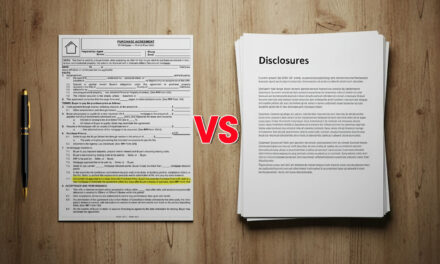Office Hours with Professor Bill is a multimedia learning experience covering fundamental real estate concepts.
In Episode 4, Professor Bill responds to questions about:
- agency relationships complications;
- different types of conflicts of interest; and
- the conduct of a licensee acting as their own principal.
What are some of the things that complicate agency relationships in real estate transactions?
A conflict of interest arises when a broker or their agent, acting on behalf of a client, has a competing professional or personal bias which hinders their ability to fulfill the fiduciary duties they have undertaken on behalf of their client.
Rest assured, a broker’s financial objective of compensation for services rendered is not a conflict of interest.
But what does an actual conflict of interest look like in the field?
A conflict of interest addresses an agent’s or broker’s personal relationship or motivations that are potentially at odds with the agency duty of care and protection they owed their client.
As you can see, a conflict of interest creates a fundamental agency dilemma for brokers. It is not a simple compensation or business referral issue.
Fees and benefits derived from conflicting sources are required to be disclosed to the client. This includes compensation in the form of:
- professional courtesies.
- family favors; and
- preferential treatment by others toward the broker or their agents.
Unless disclosed and the client consents, the conflict is a breach of the broker’s fiduciary duty of good faith, fair dealing, and trust owed to the client when the broker continues to act on the client’s behalf.
When does a conflict of interest arise?
A conflict of interest arises when the broker:
- has a pre-existing relationship with another person; and
- that relationship might hinder their ability to fully represent the needs of their client.
The pre-existing relationship comes in many forms. It is most commonly due to:
- kinship;
- employment;
- partnership;
- common membership;
- religious affiliation; or
- civic ties.
However, a conflict of interest can arise more broadly out of any other socio-economic context.
Now the pre-existing relationship alone doesn’t constitute a conflict.
The relationship must create the potential that it might impede the licensee’s ability to represent the client.
Notice that I said “might” hinder their ability to fully represent the needs of their client.
The potentiality itself creates a conflict – even if in practice the agent’s duties are not compromised.
So, does the existence of a pre-existing relationship that might impede the licensee’s ability to represent a client automatically kill a deal?
You can still properly represent your client when a conflict of interest, whether realized or potential, is disclosed at the time it occurs or as soon as possible after the conflict arises.
The disclosure creates transparency in the transaction.
It reveals to the client the bias held by the agent which, when disclosed, allows the client to take the bias into consideration in negotiations.
A client’s tardy discovery of a conflict and their complaint to the DRE for failure to make the disclosure and obtain consent before continuing to advise or act on behalf of the client are grounds for the suspension or revocation of the agent’s or broker’s license by the DRE.
An agent or broker representing a seller is to disclose their acquisition of any direct or indirect interest in the seller’s property.
They must also disclose whether a family member, a business owned by the broker, or any other person holding a special relationship with the broker will acquire an interest in the seller’s property.
Similarly, a broker or their agent cannot act for more than one party in a transaction, including themselves, without disclosing their dual agency and obtaining the client’s consent at the time the conflict arises.
Also, a licensee has an affirmative duty to disclose to the seller their agency or other conflicting relationship they might have regarding the buyer.
The duty to disclose exists even if the seller fails to inquire into whether the broker has a relationship with the buyer.
Further, failure to disclose a broker’s personal interest as a buyer in a transaction when they are also acting as a broker on behalf of the seller constitutes grounds for discipline by the DRE.
What about a licensee acting as their own principal?
A licensee acting solely as a principal in the sale of their own property is not restricted in their conduct by compliance with agency obligations.
The broker or agent selling or buying property for their own account acts solely as the seller or buyer.
Why? Your licensee status is not a conflict since you are not holding yourself out as a broker or agent acting on behalf of another person in the transaction.
The very word “agent” requires that you act on behalf of someone else – thus, it’s impossible to be an agent for yourself.














